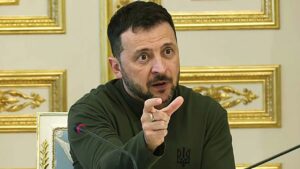
In a significant development in the ongoing Russia-Ukraine war, Ukrainian President Volodymyr Zelensky has declared his country’s readiness for an “immediate and unconditional ceasefire,” marking a renewed push for peace amid escalating international pressure and continued hostilities on the ground.
The announcement, which surfaced during peace negotiations currently underway in London, has brought a new dimension to the protracted war that began in February 2022. Zelensky’s comments come at a time when both Ukraine and Russia have endured immense human and economic costs, and the global community is increasingly vocal in its call for a resolution.
Zelensky’s declaration of readiness for an immediate ceasefire was not accompanied by any territorial preconditions. This position was emphasized again by Deputy Prime Minister Yuliia Svyrydenko, who stated in clear terms that Ukraine is open to negotiations but “will not surrender or cede any part of its territory to Russia.”
This marks a notable development, as peace proposals in the past have often become entangled in the contentious issue of territory—especially regarding Crimea, which was annexed by Russia in 2014, and the Donbas region, partly occupied by Russian-backed separatists.
No Room for Concessions
Despite Zelensky’s openness to peace, Ukraine remains unwavering in its refusal to accept any ceasefire terms that involve land concessions. Reports from The Guardian and The Times note that Ukraine has firmly rejected U.S. Vice President JD Vance’s proposal that suggested freezing territorial lines near current positions, which would effectively leave parts of Ukraine under Russian control.
According to Ukrainian officials, any deal that legitimizes Russian occupation would not only undermine Ukraine’s sovereignty but also embolden future acts of aggression.
“There can be no peace built on capitulation,” said Deputy Prime Minister Svyrydenko. “We want a ceasefire, but it must be one that paves the way for a just and lasting peace—not a pause for further .
Global Reactions and Challenges Ahead
The international community has had mixed reactions to Zelensky’s statement. While many Western allies support Ukraine’s desire for a peaceful resolution, some are beginning to show signs of fatigue, both politically and economically, with the prolonged conflict. In the United States, political divisions over aid to Ukraine continue to shape Washington’s strategy.
Meanwhile, the Russian side has yet to officially respond to the Ukrainian president’s latest call. Kremlin spokespersons have previously dismissed ceasefire calls as strategic tactics, insisting that Ukraine must acknowledge Russia’s territorial gains.
This deadlock underscores the challenges ahead, as both sides appear to be sticking to fundamentally incompatible positions.
Ongoing Hostilities Undermine Peace Talk
Even as diplomatic discussions unfold, the situation on the battlefield remains grim. Russian forces continue to launch drone and missile attacks on civilian targets across Ukraine. In one of the most recent incidents, deadly strikes were reported in Dnipro and Kharkiv, further highlighting the humanitarian toll of the war.
These continued attacks, according to Ukrainian analysts, make a meaningful ceasefire all the more urgent. “The longer the fighting continues, the harder it will be to negotiate anything that resembles peace,” said Kyiv-based political expert Serhii Kovalchuk.
WHAT COMES NEXT ?
While Zelensky’s announcement has been welcomed by peace advocates, it also puts pressure on both Russia and Ukraine’s Western allies to clearly define their positions in the weeks ahead. The current peace framework, which emphasizes ceasefire without concessions, will likely remain a point of contention in future negotiations.
Some analysts believe that this call for a ceasefire may be aimed at shifting global public opinion—especially in countries growing wary of extended conflict—while reasserting Ukraine’s diplomatic credibility.
Others argue that unless Russia signals genuine interest in reciprocal talks, Zelensky’s call may have limited practical impact.
IN CONCLUSION
Zelensky’s call for an immediate, unconditional ceasefire reflects Ukraine’s desire to halt the bloodshed and open the door for peace. However, the road ahead remains fraught with geopolitical complexity, mistrust, and continued violence.
